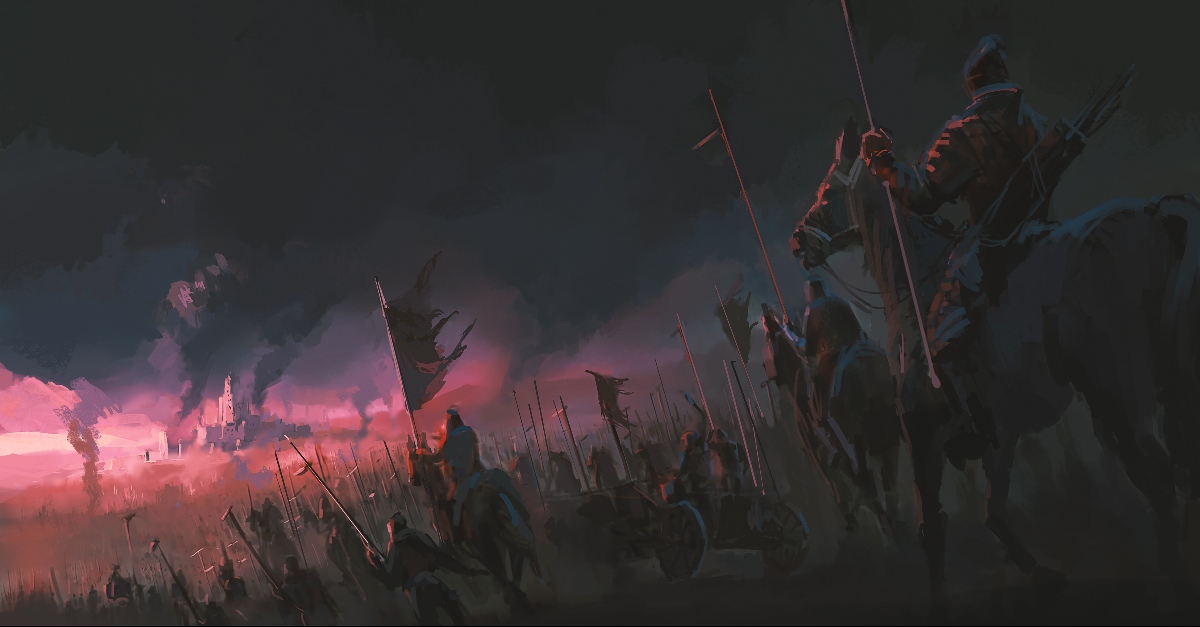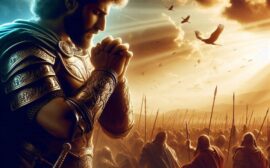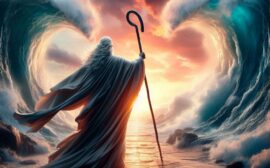By: Brian G. Chilton | March 14, 2022
With the recent global activities, particularly Russia’s invasion of Ukraine, many have begun postulating what these could mean concerning biblical prophecy; if anything. Believers and scholars alike have pinpointed Russia as the mysterious kingdom from the north, linked with the mysterious Gog and Magog.[1] A person recently asked me what I thought about this association. Before writing this article, I had not given a lot of thought to the issue. In full disclosure, I am of the Augustinian approach when it comes to biblical interpretation. The Augustinian approach—developed from the interpretive practices of Augustine of Hippo—begins with a literal interpretation of Scripture before making any practical application or drawing any spiritual conclusion. Also, I am of the futurist perspective, meaning that I do believe that certain biblical prophecies point to future eschatological events. When studying the material, I came to some startling conclusions that I would like to share with you.
Daniel, the Kingdom from the North, and the Revelation of God
First, we must begin with what the Bible tells us about the kingdom of the north. Daniel and Ezekiel are the main prophets who mention the land of the north. Let’s look at what both passages say and draw some conclusions from the texts. Daniel chapter 11 provides the first glimpse of the king of the North. This stems from a vision that Daniel had during the first year of the reign of Darius the Mede (Dan. 11:1). He notes the arrival of three kings from Persia, with a fourth also arising who is far wealthier than the first three (Dan. 11:2). Daniel then mentions two kings—a king of the South and a king of the North—who would enter the land before returning to their homeland (Dan. 11:8–9). Who are these two kings? Are they intended to speak of future eschatological kings to come, or are they speaking of historical kings near Daniel’s time?
The majority of biblical scholars agree that Daniel speaks of kings who would conquer the land not long from the time of Daniel in the first part of the chapter. The king of the South most likely refers to Egyptian empires who would move upon the land, whereas the king of the North most likely refers to the Seleucid throne established in Syria and Babylon.[2] Therefore, the king of the South would be Ptolemy I who ruled from 322 BC to 285 BC, at least initially. The king of the North initially referred to Seleucus I Nicator (312–280 BC), and then to the Seleucid and Antiochene rulers. Antiochus IV Epiphanes (175–163 BC) was especially vile. He would overtake and defile the Temple of Jerusalem. Thus, there does not appear to be anything that would relate to Russia in Daniel 11 from a historical perspective, at least until one comes to 11:36.
Daniel does provide a glimpse of the end-times and the antichrist in 11:36–12:3. But even then, the title “King of the North” most likely refers to the antichrist and a confederation of powers that is relative to the nation of Israel.[3] It is uncertain who the king of the South might be in this scenario. Another theory claims that this scenario may reference a heavenly, or spiritual view, behind the earthly conflicts, lending to the thought that the king of the North refers again to the Antiochene kings.[4] Even if the latter view is true, Daniel 11:36–12:3 could show that Antiochus IV Epiphanes is a typology for the antichrist of the future. That is a strong possibility because John does the same with Nero in the book of Revelation, particularly with the Gematria behind the number 666 or 616.[5]
Ezekiel, the Kingdom from the North, and the Revelation of God
Second, we need to examine what Ezekiel says about the kingdom of the North. Ezekiel also mentions a king from the North, except that he calls them Gog and Magog. Ezekiel writes, “The word of the Lord came to me: ‘Son of man, face Gog, of the land of Magog, the chief prince of Meshach and Tubal. Prophesy against him” (Eze. 38:1).[6] The prophet goes on to say that Gomer and Beth-togarmah “from the remotest parts of the north with all its troops—many peoples are with you” (Ezek. 38:6) would gather against Israel. Furthermore, he goes on to say the following:
“On that day when my people Israel are dwelling securely, will you not know this and come from your place in the remotest parts of the north—you and many peoples with you, who are all riding horses—a huge assembly, a powerful army? You will advance against my people Israel like a cloud covering the land. It will happen in the last days, Gog, that I will bring you against my land so that the nations may know me, when I demonstrate my holiness through you in their sight” (Ezek. 38:14b–16).
It sure appears that verses 14–16 are eschatological in nature due to the switch in language from the present time to a future eschatological age. But are they? Most assuredly, they are. But this brings to mind the following question:
Who is Gog?
But to answer any connection with Russia, one must ask, who is Gog? Gog is most certainly an adversary of God and his people.[7] But is this a person or nation? Is it even human?
The simplest answer to the first question is that we simply do not know. Numerous options have been offered. The name Gog in the time of Ezekiel was most commonly linked with Gyges, the seventh-century BC king of Lydia in Asia Minor (modern-day Turkey)[8] who was known for his ruthlessness.[9] Other possibilities include Gagu of Sakhi, an area north of Assyria;[10] an unnamed ruler of Sumeria (from the Sumerian term gug, meaning “darkness”);[11] a title for a pharaoh;[12] or a generalized term for any enemy of God’s people.[13]
Concerning the final question listed above, there is a strong possibility that Gog and Magog could refer to something in the supernatural realm. Gog and Magog could have either been understood to be a malevolent figure (or figures) empowered by demonic entities, or an entity from the supernatural realm determined to eradicate God’s people.[14] Interestingly, this view finds credence in the Qumran War Scroll, which says, “[You are God … when You] carry out judgments on Gog and on all his company that are as[semb]led [about us], for You will do battle against them from the heav[ens.]”[15]
Revelation 20:8 also lends to this interpretation. It reads as follows:
“When the thousand years are completed, Satan will be released from his prison and will go out to deceive the nations at the four corners of the earth, Gog and Magog, to gather them for battle. Their number is like the sand of the sea. They came up across the breadth of the earth and surrounded the encampment of the saints, the beloved city. Then fire came down from heaven and consumed them. The devil who deceived them was thrown into the lake of fire and sulfur where the beast and the false prophet are, and they will be tormented day and night forever and ever” (Rev. 20:7–10).
The text seems to label Gog and Magog as spiritual entities who are led out by Satan after his release from captivity. Even still, go back to verse 6. This gathering occurs after the resurrection of the saints and the millennial reign of Christ. If this is the timeframe with which we are dealing, then it becomes far more difficult to ascribe any particular nation as the demonic Gog and Magog entities. At this juncture, Gog and Magog appear at the conclusion of the millennial reign of Christ. Furthermore, Gog and Magog gather all nations from across the globe to battle the millennial kingdom, its king, and citizens (Rev. 20:8). These events are not found until after the kingdom of Christ has been established. Thus, Gog and Magog are not even players on the world scene before the return of Christ regardless of who they are.
Conclusion
In this article, we have covered a lot of territory. Assuredly, we have only skimmed the surface of this topic. If I am to be completely honest, this study has opened far more questions than answers. In an effort to identify the demonic entity, many nations have been identified with Gog and Magog throughout the history of the church, including the Goths of the fourth century, the invading Arabs of the seventh century, the Mongols of the thirteenth century, the Turks of the seventeenth century, and even various popes![16] History reveals that prognosticators of various stripes label anyone or anything they do not favor as the mysterious Gog and Magog.
If we are to be true to the biblical data and the history of the church, we must be open to the possibility that the identification of Russia with Gog and Magog could simply be another false attribution as were those previously listed. Am I going to say that it is impossible that Gog and Magog reference Russia? No, I cannot make that claim. Because anything is possible with biblical prophecy. But to be fair, haters of the United States could just as legitimately lay claim that we are Gog and Magog seeing that Alaska is also a remote place north of Israel.[17]
Regardless of whom they may be, Revelation tells us that Gog and Magog gather the world powers against the people of God after the millennial reign and after the resurrection of the saints. Additionally, God quickly defeats Gog and Magog with fire from heaven (Rev. 20:9b–10). It certainly seems from the evidence that Gog and Magog may indicate something more of a supernatural entity than a political one. Nonetheless, let me close with the wise words of one of my professors, Dr. Gary Yates, who advises, “Prophecy does not always satisfy our curiosity or give us insider information into contemporary events, but the prophetic message of the Bible does assure God’s people that they are on the winning side and gives them strength to endure as they face opposition and persecution in a world that is united in its rebellion against God.”[18]
About the Author
 Brian G. Chilton is a Ph.D. Candidate in the Theology and Apologetics program at Liberty University. He is the host of The Bellator Christi Podcast and the founder of Bellator Christi. He received his Master of Divinity in Theology from Liberty University (with high distinction); his Bachelor of Science in Religious Studies and Philosophy from Gardner-Webb University (with honors); earned a Certificate in Christian Apologetics from Biola University and plans to purse philosophical studies in the near future. Brian is a member of the Evangelical Theological Society and the Evangelical Philosophical Society.
Brian G. Chilton is a Ph.D. Candidate in the Theology and Apologetics program at Liberty University. He is the host of The Bellator Christi Podcast and the founder of Bellator Christi. He received his Master of Divinity in Theology from Liberty University (with high distinction); his Bachelor of Science in Religious Studies and Philosophy from Gardner-Webb University (with honors); earned a Certificate in Christian Apologetics from Biola University and plans to purse philosophical studies in the near future. Brian is a member of the Evangelical Theological Society and the Evangelical Philosophical Society.
Brian has served in pastoral ministry for nearly 20 years and currently serves as a clinical hospice chaplain. Additionally, he serves as an editor for the Eleutheria Journal and is an Associate Editor for MoralApologetics.com. At the prompting of the Lord, Brian established Bellator Christi Ministries in 2012. The ministry is aimed to provide readily available resources in theology, apologetics, biblical studies, and philosophy to those who want to know what Christianity teaches and why it should be believed. In 2019, Brian published his first book entitled the Layman’s Manual on Christian Apologetics. After finishing his Ph.D., Brian intends to publish more books. His areas of expertise include early NT creeds, near-death experiences, biblical reliability, the blend of divine sovereignty and human freedom, and the need for empathy.
https://www.amazon.com/Laymans-Manual-Christian-Apologetics-Essentials/dp/1532697104
Notes
[1] See David Jeremiah, “Russia’s Role in End-Times Prophecy,” DavidJeremiahBlog, https://davidjeremiah.blog/what-does-the-bible-say-about-modern-russia/, accessed March 13, 2022.
[2] John E. Goldingay, Daniel, Word Biblical Commentary, vol. 30, Bruce M. Metzger, David A. Hubbard, and Glenn W. Barker, eds (Dallas, TX: Word, 1989), 295.
[3] Stephen R. Miller, Daniel, New American Commentary, vol. 18, E. Ray Clendenen, ed (Nashville, TN: B&H, 1994), 309.
[4] Goldingay, Daniel, WBC, 306.
[5] Depending on the MSS.
[6] Unless otherwise noted, all quoted Scripture comes from the Christian Standard Bible (Nashville, TN: Holman, 2020).
[7] Lamar Eugene Cooper, Sr, Ezekiel, New American Commentary, vol. 17, E. Ray Clendenen, ed (Nashville, TN: B&H, 1994), 328–329.
[8] David A. Croteau and Gary E. Yates, Urban Legends of the Old Testament and Common Misconceptions (Nashville, TN: B&H Academic, 2019), 230.
[9] Cooper, Ezekiel, 331.
[10] Ibid.
[11] Ibid.
[12] Ibid.
[13] Ralph H. Alexander, Ezekiel, Everyman’s Bible Commentary (Chicago, IL: Moody, 1976), 929.
[14] “Gog would have been perceived as either a figure empowered by supernatural evil or an evil quasi-divine figure from the supernatural world bent on the destruction of God’s people.” Michael S. Heiser, The Unseen Realm: Recovering the Supernatural World of the Bible (Bellingham, WA: Lexham, 2015), 365; Croteau and Yates, Urban Legends of the OT, 231.
[15] The Qumran War Scroll 11:16–17.
[16] Croteau and Yates, Urban Legends of the OT, 230; Iain M. Duguid, Ezekiel, New International Version Application Commentary (Grand Rapids, MI: Zondervan, 1999), 456.
[17] Let the reader know that this article was published in the United States.
[18] Croteau and Yates, Urban Legends of the OT, 234.
© 2022. BellatorChristi.com.






[…] Russia as the mysterious kingdom from the north, linked with the mysterious Gog and Magog.[1] A person recently asked me what I thought about this association. Before writing this article, I […]